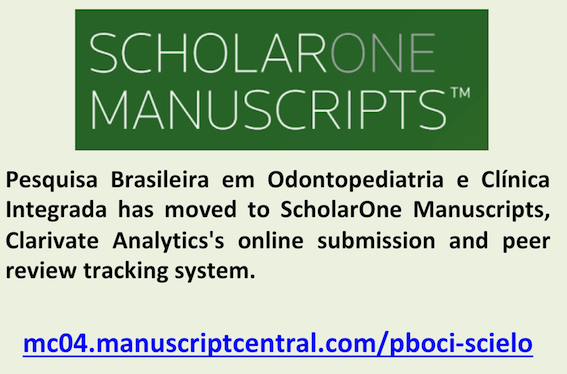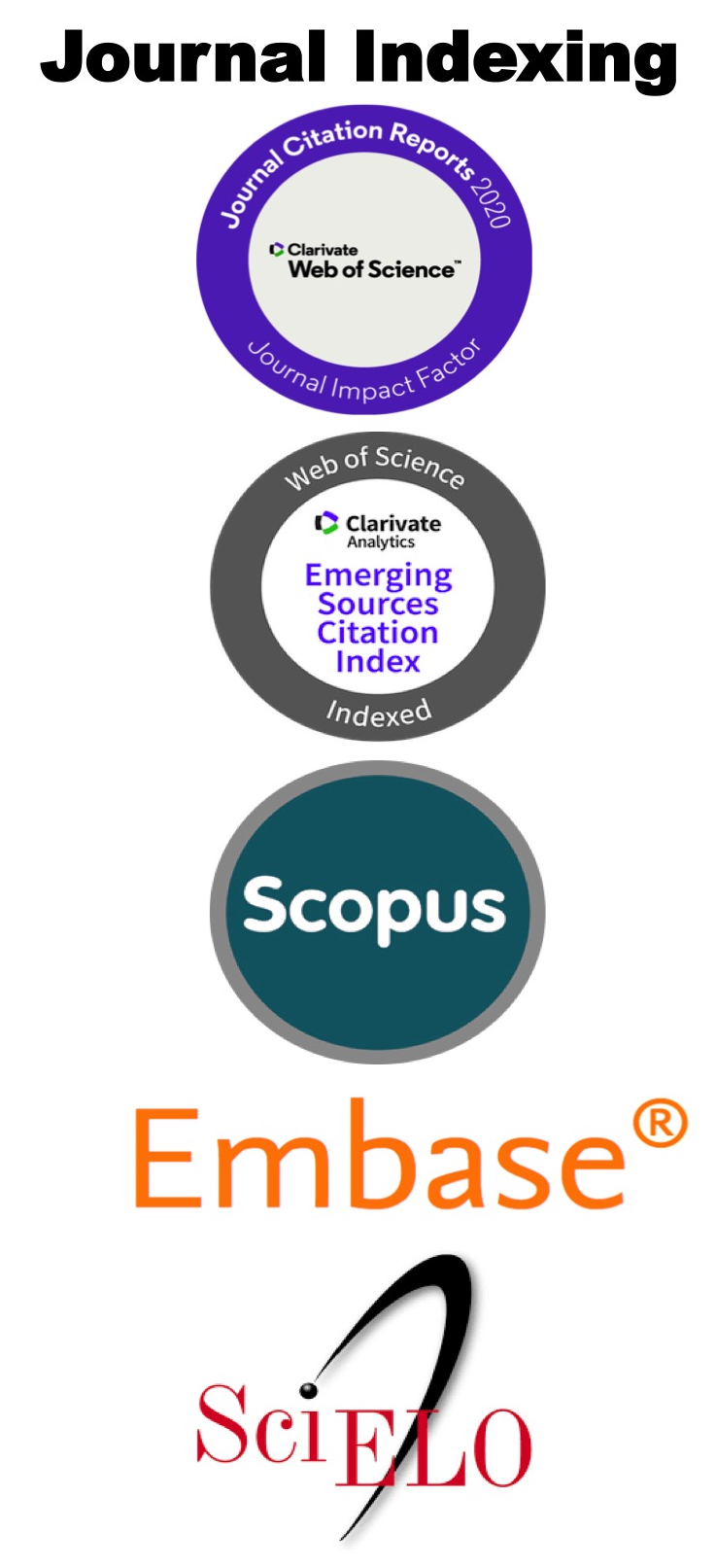The Role of Mother’s Knowledge, Attitudes, Practices in Dental Caries on Vulnerably Preschool Children
Keywords:
Cross-Sectional Studies, Dental Caries, Maternal Behavior, Socioeconomic FactorsAbstract
Objective: To analyze the association between Early Childhood Caries (ECC) and mother´s knowledge, attitudes, and practices (KAP). Material and Methods: This cross-sectional study included a random sample of 163 preschool children aged 3-4 old in southern Brazil. The severity of dental caries and ECC was assessed by ICDAS criteria, while mothers completed the semi-structured questionnaire (KAP-ECC). Maternal behavior characteristics and answered questions about socioeconomic and demographic variables. Logistic regression was performed to evaluate the association of exploratory variables with ECC. For this approach, we calculated the odds ratio (OR) and 95% confidence intervals (95% IC). Results: Dental examinations revealed that 91.4% of children presented ECC (ICDAS = 3, 4, 5 or 6). Among those children, 31.9% presented cavities (ICDAS ≥ 3). Family income was significantly associated with the presence of ECC (OR 2.17; 95% CI: 1.41-3.36). Regarding KAP-ECC, mothers have knowledge related to ECC etiology, reported dental hygiene attitudes and practices that can prevent ECC but reported less healthy attitudes and practices regarding child’s diet, specifically with respect to bottle and breastfeeding habits (OR 0.52; 95% CI: 0.33-0.81). Conclusion: ECC was more frequent in children from low-income families and whose mothers reported the belief that milk with chocolate does not contribute to caries and that disagreed that it is normal that a 2-year-old baby wakes up during the night to suckle. That is, good knowledge toward health habits may impact on lower occurrence of ECC; however, this condition also depends on the socioeconomic level.
References
Gimenez T, Bispo BA, Souza DP, Viganó ME, Wanderley MT, Mendes FM, et al. Does the decline in caries prevalence of Latin American and Caribbean children continue in the new century? evidence from systematic review with meta-analysis. PLoS One 2016; 11(10):e0164903. https://doi.org/10.1371/journal.pone.0164903
Ardenghi TM, Piovesan C, Antunes JL. Inequalities in untreated dental caries prevalence in preschool children in Brazil. Rev Saúde Pública 2013; 47(Suppl 3):129-37. https://doi.org/10.1590/s0034-8910.2013047004352
Marcenes W, Kassebaum NJ, Bernabé E, Flaxman A, Naghavi M, Lopez A, et al. Global burden of oral conditions in 1990-2010: a systematic analysis. J Dent Res 2013; 92(7):592-7. https://doi.org/10.1177/0022034513490168
Kassebaum NJ, Bernabé E, Dahiya M, Bhandari B, Murray CJ, Marcenes W. Global burden of untreated caries: a systematic review and metaregression. J Dent Res 2015; 94(5):650-8. https://doi.org/10.1177/0022034515573272
Brasil. Ministerio da Saude. Pesquisa Nacional de Saúde bBucal. SB Brasil 2010. Resultados Principais. Brasília: Ministerio da Saúde; 2011; 92p. [In Portuguese].
Ferreira SH, Beria JU, Kramer PF, Feldens EG, Feldens CA. Dental caries in 0- to 5-year-old Brazilian children: prevalence, severity, and associated factors. Int J Paediatr Dent 2007:17(4):289-96. https://doi.org/10.1111/j.1365-263X.2007.00831.x
Feldens CA, Kramer PF, Sequeira MC, Rodrigues PH, Vitolo MR. Maternal education is an independent determinant of cariogenic feeding practices in the first year of life. Eur Arch Paediatr Dent 2012; 13(2):70-5.
Plonka KA, Pukallus ML, Barnett AG, Holcombe TF, Walsh LJ, Seow WK. A longitudinal case-control study of caries development from birth to 36 months. Caries Res 2013; 47(2):117-27. https://doi.org/10.1159/000345073
Corrêa-Faria P, Paixão-Gonçalves S, Paiva SM, Pordeus IA, Marques LS, Ramos-Jorge ML. Association between developmental defects of enamel and early childhood caries: a cross-sectional study. Int J Paediatr Dent 2015; 25(2):103-9. https://doi.org/10.1111/ipd.12105
Palmer CA, Kent R Jr., Loo CY, Hughes CV, Stutius E, Pradhan N, et al. Diet and caries-associated bacteria in severe early childhood caries. J Dent Res 2010; 89(11):1224-9. https://doi.org/10.1177/0022034510376543
Slabsinskiene E, Milciuviene S, Narbutaite J, Vasiliauskiene I, Andruskeviciene V, Bendoraitiene EA, et al. Severe early childhood caries and behavioral risk factors among 3-year-old children in Lithuania. Medicina 2010; 46(2):135- 41.
Wulaerhan J, Abudureyimu A, Bao XL, Zhao J. Risk determinants associated with early childhood caries in Uygur children: a preschool-based cross-sectional study. BMC Oral Health 2014; 14:136. https://doi.org/10.1186/1472-6831-14-136
Chaffee BW, Rodrigues PH, Kramer PF, Vítolo MR, Feldens CA. Oral health-related quality-of-life scores differ by socioeconomic status and caries experience. Community Dent Oral Epidemiol 2017; 45(3):216-24. https://doi.org/10.1111/cdoe.12279
Fisher-Owens SA, Gansky SA, Platt LJ, Weintraub JA, Soobader MJ, Bramlett MD, et al. Influences on children's oral health: a conceptual model. Pediatrics 2007; 120(3):e510-20. https://doi.org/10.1542/peds.2006-3084
Seow WK. Environmental, maternal and child factors which contribute to early childhood caries: unifying conceptual model. Int J Paediatr Dent 2012; 22(3):157-68. https://doi.org/10.1111/j.1365-263X.2011.01186.x
World Health Organization Stop TB Partnership. Advocacy, communication and social mobilization for TB control: a guide to developing knowledge, attitude and practice surveys. Geneva: World Health Organization, 2008;35p.
Rodrigues JA, de Oliveira RS, Hug I, Neuhaus K, Lussi A. Performance of experienced dentists in Switzerland after an e-learning program on ICDAS occlusal caries detection. J Dent Educ 2013; 77(8):1086-91.
Ekstrand KR, Martignon S, Ricketts DJ, Qvist V. Detection and activity assessment of primary coronal caries lesions: a methodologic study. Oper Dent 2007; 32(3):225-35.
Ismail AI, Sohn W, Tellez M, Amaya A, Sen A, Hasson H, Pitts NB. The International Caries Detection and Assessment System (ICDAS): an integrated system for measuring dental caries. Community Dent Oral Epidemiol 2007; 35(3):170-8. https://doi.org/10.1111/j.1600-0528.2007.00347.x
Mendes FM, Braga MM, Oliveira LB, Antunes JL, Ardenghi TM, Bonecker M. Discriminant validity of the International Caries Detection and Assessment System (ICDAS) and comparability with World Health Organization criteria in a cross-sectional study. Community Dent Oral Epidemiol 2010; 38(5):398-407. https://doi.org/10.1111/j.1600-0528.2010.00557.x
Mitrakul K, Laovoravit V, Vanichanuwat V, Charatchaiwanna A, Bunpradit W, Arunakul M. Factors associated with parent capability on child's oral health care. Southeast Asian J Trop Med Public Health 2012; 43(1):249-55.
Suma-Sogi HP, Hugar SM, Nalawade TM, Sinha A, Hugar S, Mallikarjuna RM. Knowledge, attitude, and practices of oral health care in prevention of early childhood caries among parents of children in Belagavi city: a Questionnaire study. J Family Med Prim Care 2016; 5(2):286-90.
Seow WK. A nutritional program involving home visits may reduce the incidence of early childhood caries. J Evid Based Dent Pract 2011; 11(1):60-1. https://doi.org/10.1016/j.jebdp.2010.11.003
Maguire JL, Birken CS, Jacobson S, Peer M, Taylor C, Khambalia A, et al. Office-based intervention to reduce bottle use among toddlers: TARGet Kids! Pragmatic, randomized trial. Pediatrics 2010; 126(2):e343-50. https://doi.org/10.1542/peds.2009-3583
Firestone AR. Effect of increasing contact time of sucrose solution of powdered sucrose on plaque pH in vivo. J Dent Res 1982; 61(11):1243-4.
Dini EL, Holt RD, Bedi R. Caries and its association with infant feeding and oral health-related behaviours in 3-4- year-old Brazilian children. Community Dent Oral Epidemiol 2000; 28(4):241-8.
Fadel CB, Saliba NA. Aspectos sócio-dentais e de representação social da cárie dentária no contexto materno-infantil. RGO 2009; 57:303-9. [In Portuguese].
Hallett KB, O'Rourke PK. Social and behavioural determinants of early childhood caries. Aust Dent J 2003; 48(1):27- 33.
Menon I, Nagarajappa R, Ramesh G, Tak M. Parental stress as a predictor of early childhood caries among preschool children in India. Int J Paediatr Dent 2013; 23(3):160-5. https://doi.org/10.1111/j.1365-263X.2012.01238.x
Nunn ME, Braunstein NS, Krall Kaye EA, Dietrich T, Garcia RI, Henshaw MM. Healthy eating index is a predictor of early childhood caries. J Dent Res 2009; 88(4):361-6. https://doi.org/10.1177/0022034509334043
Freire MCM, Reis SC, Figueiredo N, Peres KG, Moreira RS. Antunes JL. Individual and contextual determinants of dental caries in Brazilian 12-year-olds in 2010. Rev Saúde Pública 2013; 47(3):40-9. https://doi.org/10.1590/s0034-8910.2013047004322
Schwendicke F, Dorfer CE, Schlattmann P, Foster Page L, Thomson WM, Paris S. Socioeconomic inequality and caries: a systematic review and meta-analysis. J Dent Res 2015; 94:10-8. https://doi.org/10.1177/0022034514557546
Tomazoni F, Vettore MV, Mendes FM, Ardenghi TM. The Association between sense of coherence and dental caries in low social status schoolchildren. Caries Res 2018 25; 53(3):314-21. https://doi.org/10.1159/000493537
Ortiz AS, Tomazoni F, Knorst JK, Ardenghi TM. Influence of socioeconomic inequalities on levels of dental caries in adolescents: a cohort study. Int J Paediatr Dent 2019. https://doi.org/10.1111/ipd.12572
Finlayson TL, Siefert K, Ismail AI, Sohn W. Maternal self-efficacy and 1-5-year-old children's brushing habits.
Community Dent Oral Epidemiol 2007; 35(4):272-81. https://doi.org/10.1111/j.1600-0528.2007.00313.x
Vann WFJr, Lee JY, Baker D, Divaris K. Oral health literacy among female caregivers: impact on oral health outcomes in early childhood. J Dent Res 2010; 89(12):1395-400. https://doi.org/10.1177/0022034510379601
Peres MA, Macpherson LMD, Weyant RJ, Daly B, Venturelli R, Mathur MR, et al. Oral diseases: a global public health challenge. Lancet 2019; 394(10194):249-60. https://doi.org/10.1016/S0140-6736(19)31146-8
de Amorim RG, Figueiredo MJ, Leal SC, Mulder J, Frencken JE. Caries experience in a child population in a deprived area of Brazil, using ICDAS II. Clin Oral Investig 2012; 16(2):513-20. https://doi.org/10.1007/s00784-011-0528-9
Guedes RS, Ardenghi TM, Piovesan C, Emmanuelli B, Mendes FM. Influence of initial caries lesions on quality of life in preschool children: a 2-year cohort study. Community Dent Oral Epidemiol 2016; 44(3):292-300. https://doi.org/10.1111/cdoe.12217
Guedes RS, Piovesan C, Ardenghi TM, Emmanuelli B, Braga MM, Mendes FM. Presence of initial caries lesions as a risk factor for caries in preschool children: a cohort study. Caries Res 2018; 52(1-2):32-41. https://doi.org/10.1159/000479824
Downloads
Published
How to Cite
Issue
Section
License
Copyright (c) 2022 Pesquisa Brasileira em Odontopediatria e Clínica Integrada

This work is licensed under a Creative Commons Attribution-NonCommercial 4.0 International License.



